At Home With Mr. & Mrs. Wotan

The Washington National Opera’s first installment of their Ring cycle has been well received by critics and understandably so. Das Rheingold is an immensely enjoyable opera – and if Francesca Zambello’s production is not great in itself, it allows for -and sometimes aids- the opera to unfold most of its charm. The ripples of laughter that ran through the Opera house Saturday and Thursday (a rare enough, much welcome, phenomenon) did not come at the expense of the opera, nor were they caused by cheap jokes or slapstick but were a direct result of Wagner’s (understandably underrated) comedic side. Most laughter comes as the audience reads the supertitles which, although modified as mentioned in my (p)review, are straight forward; hardly re-creations á la Peter Sellars. Das Rheingold is, after all, chock full of humor, much of which to be found on the deeply sarcastic and ironic side. Zambello never stands in the way of that, even if her Loge – Robin Leggate (a fondly remembered Captain Vere in the 2004 Billy Budd) – could easily be played more ironically distanced from the Gods, especially in the fourth scene. You never quite see that he is only half God, a society’s outsider. He fits in too well with the Gods, his decision to pass on the move to Walhall comes as an unremarkable surprise.
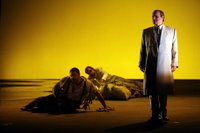 If the Rheingold works as a whole, that is not to say that the production works everywhere equally well. If the “American Ring” idea came across as weak or incoherent it is because there is little connection at all between the first scene, set in an overt American West (gold-digging Alberich), and rest of the opera. Elena Zaremba’s Erda comes as a similarly disjointed reminder of that theme – rather out of place in the last scene. If the ‘American’ character is to emerge fully and more understandably, it won’t be until the next installment of the Ring.
If the Rheingold works as a whole, that is not to say that the production works everywhere equally well. If the “American Ring” idea came across as weak or incoherent it is because there is little connection at all between the first scene, set in an overt American West (gold-digging Alberich), and rest of the opera. Elena Zaremba’s Erda comes as a similarly disjointed reminder of that theme – rather out of place in the last scene. If the ‘American’ character is to emerge fully and more understandably, it won’t be until the next installment of the Ring.
The projections between the scenes (covering very noisy scene changes), too, are an unripe idea with more potential than success. Whenever the images are muted and organic, they work well. But the bright, low quality CGI renderings look like old Windows screen savers; the flight back to Walhall between the second and third scene, once it ‘hits air’, reminds of a cheesy Airline commercial – then descends swirly-swirl into the Grand Canyon. Many intriguing or sensible ideas are touched upon (like in the flight through space during the Vorspiel) but quickly surrendered to other, less cogent images intruding. Color changes appear haphazard and neurotic; the switch between a suggestive sea of colors and shapes and jarring representational and obvious images (iron smelting before scene three: thanks for the reminder that the Niebelungs are not slaving away cleaning tourist’s trash from the bottom of the canyon) does not actually add any congruity.
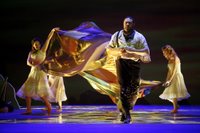 The Gold is represented by a quilt (very American, indeed: Innocent history stolen by the intruding slaver Alberich) which isn’t all too bad but looks like a suspiciously economic solution. The firework blast before Alberich’s transformation into a worm (here: a bright yellow copperhead) cracks so deafeningly through the hall that, for a second, the startled audience held its collective breath and then laughed with relief. Catching the toad (a frog in this production) is always a fun moment. Where Donner's architect’s T-bar instead of a hammer added to the second scene, it’s not quite so convincing when he summons thunder with the fragile tool in the fourth scene.
The Gold is represented by a quilt (very American, indeed: Innocent history stolen by the intruding slaver Alberich) which isn’t all too bad but looks like a suspiciously economic solution. The firework blast before Alberich’s transformation into a worm (here: a bright yellow copperhead) cracks so deafeningly through the hall that, for a second, the startled audience held its collective breath and then laughed with relief. Catching the toad (a frog in this production) is always a fun moment. Where Donner's architect’s T-bar instead of a hammer added to the second scene, it’s not quite so convincing when he summons thunder with the fragile tool in the fourth scene.

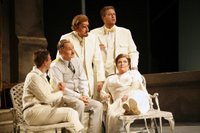 None of these elements are fatal to the venture, few miscues (characters not looking at the action they sing about, or other characters not actually doing what is being responded to) mar a first impression and are only more noticeable upon repeated exposure. Most could (but won’t) be ironed out within even one run. The over-all enjoyment of the opera rains very high. That is also thanks due to good acting and fairly good singing. Robert Hale as Wotan was solid (although notably tired at points). Not the big voice that Wotan demands but nicely nuanced. Elizabeth Bishop, a feisty, chubby, cute Fricka was impressive and likable. Unlike portraying Fricka as the God’s Yoko Ono, she had the audience on her character’s side. Jane Ohmes as youth-bringing Freia acted well, which is easily half her character’s game, and sang well under the direct threat of being molested by the Giants. Her brothers, hapless Froh (Corey Evan Rotz) and Donner (Detlef Roth) are young singers, the former an in-house product who I found likeable for the first time; the former an import from Germany. They sang and acted well – with room for improvement, both. Donner’s anger in scene four, to the production’s fault, not Mr. Roth’s, seemed completely unmotivated and purposeless.
None of these elements are fatal to the venture, few miscues (characters not looking at the action they sing about, or other characters not actually doing what is being responded to) mar a first impression and are only more noticeable upon repeated exposure. Most could (but won’t) be ironed out within even one run. The over-all enjoyment of the opera rains very high. That is also thanks due to good acting and fairly good singing. Robert Hale as Wotan was solid (although notably tired at points). Not the big voice that Wotan demands but nicely nuanced. Elizabeth Bishop, a feisty, chubby, cute Fricka was impressive and likable. Unlike portraying Fricka as the God’s Yoko Ono, she had the audience on her character’s side. Jane Ohmes as youth-bringing Freia acted well, which is easily half her character’s game, and sang well under the direct threat of being molested by the Giants. Her brothers, hapless Froh (Corey Evan Rotz) and Donner (Detlef Roth) are young singers, the former an in-house product who I found likeable for the first time; the former an import from Germany. They sang and acted well – with room for improvement, both. Donner’s anger in scene four, to the production’s fault, not Mr. Roth’s, seemed completely unmotivated and purposeless.
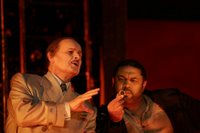 Gordon Hawkins’ Alberich acts well (if with less menace than desirable) and sings better still. On Thursday he declined notably in voice and was thinner and drowned out towards the last scene. As in Porgy, I got the feeling that he is great when ‘on’ but not very good at economically using his voice. Gary Rideout’s Mime was a badly pronounced, modestly acted, unevenly sung disappointment. The three Rivermaidens Woglinde, Wellgunde, Flosshilde (JiYoung Lee, Frédérique Vézina, Jennifer Hines) were three attractive moisten, fishy temptresses. Nicely distinct in voice, all were good – with Ms. Vézina sounding the clearest.
Gordon Hawkins’ Alberich acts well (if with less menace than desirable) and sings better still. On Thursday he declined notably in voice and was thinner and drowned out towards the last scene. As in Porgy, I got the feeling that he is great when ‘on’ but not very good at economically using his voice. Gary Rideout’s Mime was a badly pronounced, modestly acted, unevenly sung disappointment. The three Rivermaidens Woglinde, Wellgunde, Flosshilde (JiYoung Lee, Frédérique Vézina, Jennifer Hines) were three attractive moisten, fishy temptresses. Nicely distinct in voice, all were good – with Ms. Vézina sounding the clearest.

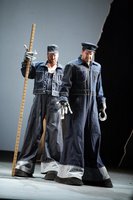 Which brings me to my favorite part of this ring: Fasolt and Fafner. Regular patrons of the opera will have seen plenty of John Marcus Bindel – now ten years with the WNO. Like his colleague Rotz, I never saw more than a convenient patch for an unfilled role in him (recently Hunding, Mathieu, Bethune, Iago); never found him vocally or dramatically any more than acceptable. And here, as Fasolt, the cutsey Giant, I found him to be stand-out of the production. All the sudden he excelled on every level, singing and acting so equally impressive that he became the character, all Fasolt (perhaps with a touch of Brendan Fraser). It goes in part to the credit of the production if a singer finds his way that completely into a character – and Bindel, who sang the hell out of the music, made the most of it. Not only Freia was sad to see him slain by his fine college Fafner a.k.a. Jeffry Wells (who was notably less secure at either ends of his vocal range).
Which brings me to my favorite part of this ring: Fasolt and Fafner. Regular patrons of the opera will have seen plenty of John Marcus Bindel – now ten years with the WNO. Like his colleague Rotz, I never saw more than a convenient patch for an unfilled role in him (recently Hunding, Mathieu, Bethune, Iago); never found him vocally or dramatically any more than acceptable. And here, as Fasolt, the cutsey Giant, I found him to be stand-out of the production. All the sudden he excelled on every level, singing and acting so equally impressive that he became the character, all Fasolt (perhaps with a touch of Brendan Fraser). It goes in part to the credit of the production if a singer finds his way that completely into a character – and Bindel, who sang the hell out of the music, made the most of it. Not only Freia was sad to see him slain by his fine college Fafner a.k.a. Jeffry Wells (who was notably less secure at either ends of his vocal range).
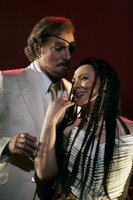 The only big disappointment was Zaremba’s Erda. What happened to that voice – so clear and immensely impressive as Fricka two years ago? What I heard from her was nothing like anything I have ever heard from her before: Wobbly, dense, muddled, pushed. A choice of characterization? I’ve heard resonant Erdas emitting sounds from a hole in the stage – but surely it ought not sound like that when Erda is on stage, free to project into the audience? An awful performance from a singer I greatly admire.
The only big disappointment was Zaremba’s Erda. What happened to that voice – so clear and immensely impressive as Fricka two years ago? What I heard from her was nothing like anything I have ever heard from her before: Wobbly, dense, muddled, pushed. A choice of characterization? I’ve heard resonant Erdas emitting sounds from a hole in the stage – but surely it ought not sound like that when Erda is on stage, free to project into the audience? An awful performance from a singer I greatly admire.
Heinz Fricke and the orchestra, finally, must feel sympathy with Alberich and the Niebelungs. It is difficult to imagine how much hard and frustrating labor went into this performance – but the result was presumably worth it. Subtly of interpretation and particular coloration should not be expected. Merely playing well and not screwing up the over-all impression was the order of the day. Mission accomplished. Even the fortified horn section held tight, no small achievement for this brass-taxing work. Without the fruits of their labor, this heartening, funny, entertaining prelude to the “American Ring” - successful and problem fraught as it is - would not have taken off.






















































No comments:
Post a Comment